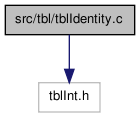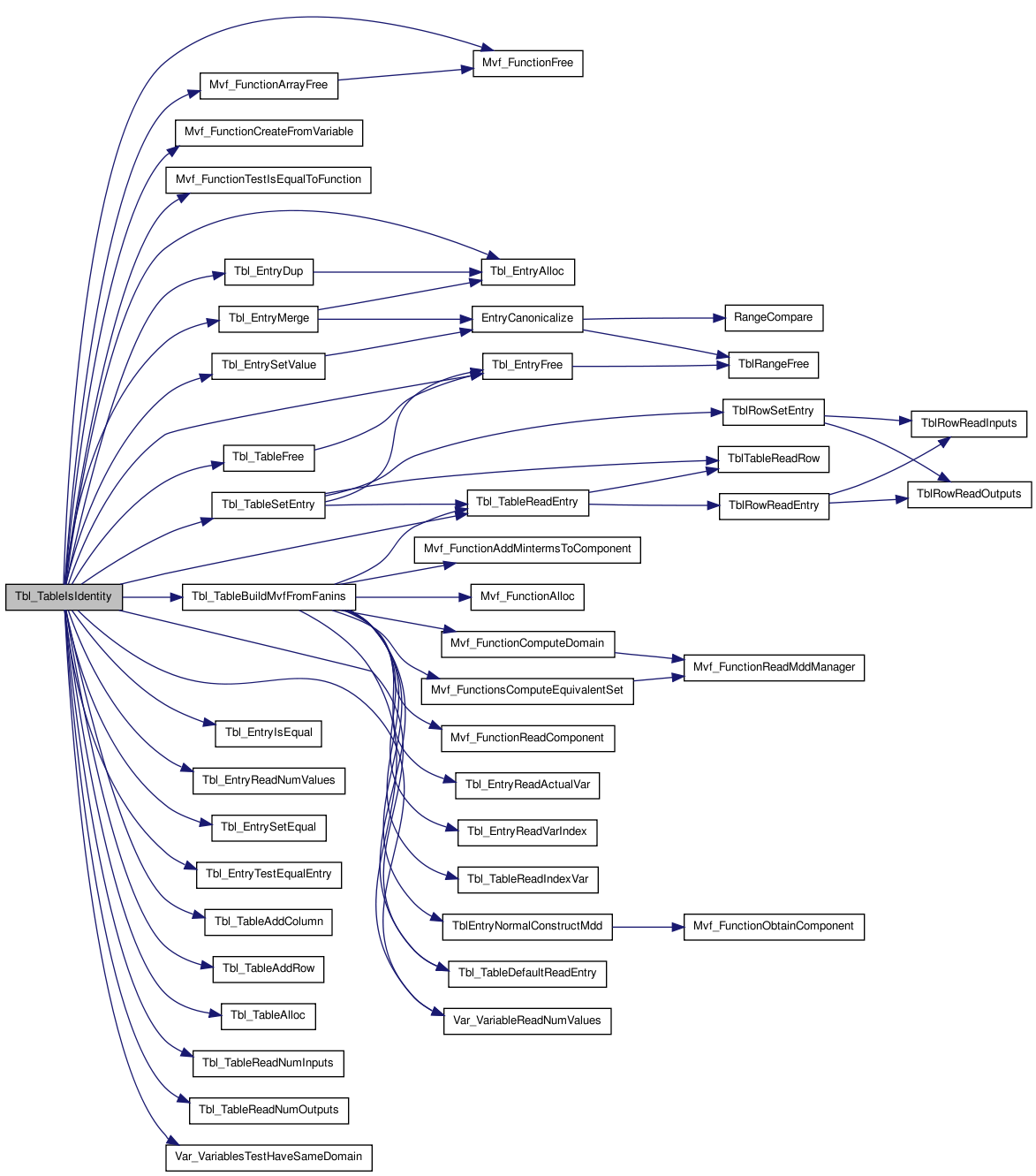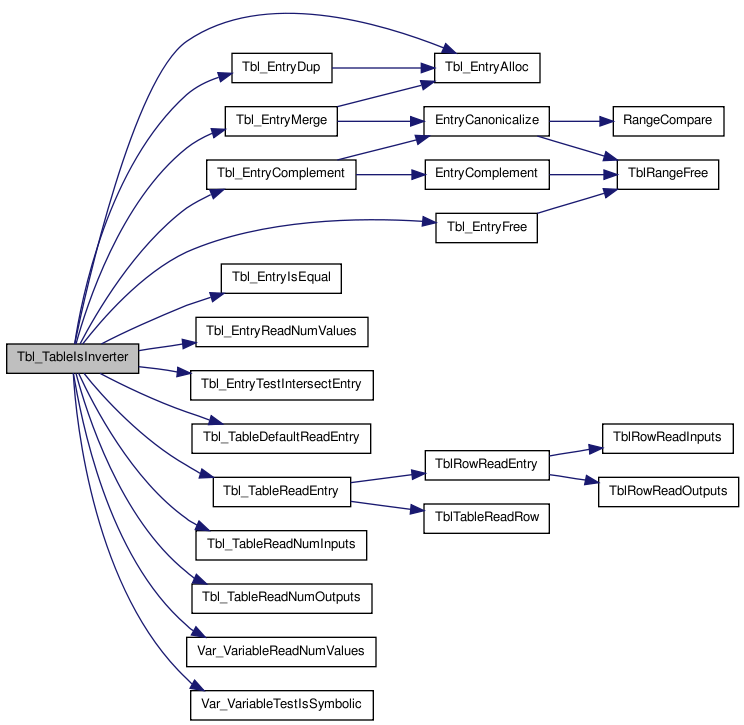#include "tblInt.h" Include dependency graph for tblIdentity.c:
Include dependency graph for tblIdentity.c:Go to the source code of this file.
Functions | |
| boolean | Tbl_TableIsIdentity (Tbl_Table_t *table) |
| boolean | Tbl_TableIsInverter (Tbl_Table_t *table) |
Variables | |
| static char rcsid[] | UNUSED = "$Id: tblIdentity.c,v 1.1 2009/04/11 07:10:15 fabio Exp $" |
Function Documentation
| boolean Tbl_TableIsIdentity | ( | Tbl_Table_t * | table | ) |
AutomaticStart AutomaticEnd Function********************************************************************
Synopsis[Check whether a table describes an identity function.]
Description [This function checks whether a table describes an identity. An identity table has exactly one input and one output variable, which takes the same value as the input.]
SideEffects []
SeeAlso []
Definition at line 98 of file tblIdentity.c.
{
Var_Variable_t *invar = NIL(Var_Variable_t), *outvar = NIL(Var_Variable_t);
Var_Variable_t *var;
int colNum, rowNum;
Tbl_Entry_t *inputEntry, *outputEntry, *defaultEntry, *cumulative;
boolean result;
#if 0
Mvf_Function_t *outMvf, *inMvf, *identMvf;
array_t *mvarValues;
array_t *inMvfArray;
Tbl_Table_t *ident;
#endif
if (Tbl_TableReadNumInputs(table) != 1) return FALSE;
if (Tbl_TableReadNumOutputs(table) != 1) return FALSE;
Tbl_TableForEachInputVar(table,colNum,var) {
invar = var;
}
Tbl_TableForEachOutputVar(table,colNum,var) {
outvar = var;
}
if (!Var_VariablesTestHaveSameDomain(invar,outvar)) return FALSE;
/* We test the following condition. If a table specifies a value
* for all inputs and all rows are consistent with the identity,
* then the table is an identity. A normal default declaration is
* treated as a row whose input and output parts equal the default
* value. An equality default declaration is treated like a row
* with equality output entry and don't care input entry.
* Completeness and nondeterminism are implicitly tested by this
* criterion.
*/
defaultEntry = Tbl_TableDefaultReadEntry(table, 0);
if (defaultEntry == NIL(Tbl_Entry_t)) {
cumulative = Tbl_EntryAlloc(Tbl_EntryNormal_c);
} else if (Tbl_EntryIsEqual(defaultEntry)) {
cumulative = Tbl_EntryAlloc(Tbl_EntryNormal_c);
Tbl_EntrySetValue(cumulative, 0, Var_VariableReadNumValues(invar) - 1);
} else {
if (Tbl_EntryReadNumValues(defaultEntry) != 1) return FALSE;
cumulative = Tbl_EntryDup(defaultEntry);
}
Tbl_TableForEachOutputEntry(table, rowNum, colNum, outputEntry) {
Tbl_Entry_t *tmpEntry;
assert(colNum == 0);
inputEntry = Tbl_TableReadEntry(table, rowNum, 0, 0);
assert(!Tbl_EntryIsEqual(inputEntry));
if (!Tbl_EntryIsEqual(outputEntry)) {
if (Tbl_EntryReadNumValues(outputEntry) != 1 ||
!Tbl_EntryTestEqualEntry(outputEntry,inputEntry)) {
Tbl_EntryFree(cumulative);
return FALSE;
}
}
tmpEntry = Tbl_EntryMerge(cumulative, inputEntry);
Tbl_EntryFree(cumulative);
cumulative = tmpEntry;
}
result = Tbl_EntryReadNumValues(cumulative) ==
Var_VariableReadNumValues(invar);
Tbl_EntryFree(cumulative);
return result;
#if 0
/* Use the MVF sledgehammer. Only proceed if an mdd manager was
* passed as argument.
*/
if (mddMgr == NIL(mdd_manager)) return FALSE;
/* Create MDD variables for the table inputs. */
mdd_restart(mddMgr);
mvarValues = array_alloc(int, 1);
array_insert_last(int, mvarValues, Var_VariableReadNumValues(invar));
mdd_create_variables(mddMgr, mvarValues, NIL(array_t), NIL(array_t));
array_free(mvarValues);
/*
* Construct an MVF for each table input. The MVF for column i is the MVF
* for MDD variable i.
*/
inMvf = Mvf_FunctionCreateFromVariable(mddMgr, 0);
inMvfArray = array_alloc(Mvf_Function_t *, 1);
array_insert_last(Mvf_Function_t *, inMvfArray, inMvf);
outMvf = Tbl_TableBuildMvfFromFanins(table, 0, inMvfArray, mddMgr);
/* Build a reference identity. This can be sped up quite a bit, but
we are practicing using the tbl package. */
ident = Tbl_TableAlloc();
colNum = Tbl_TableAddColumn(ident,invar,0);
assert(colNum == 1);
colNum = Tbl_TableAddColumn(ident,outvar,1);
assert(colNum == 1);
rowNum = Tbl_TableAddRow(ident);
assert(rowNum == 0);
inputEntry = Tbl_EntryAlloc(Tbl_EntryNormal_c);
Tbl_EntrySetValue(inputEntry, 0, Var_VariableReadNumValues(invar)-1);
Tbl_TableSetEntry(ident,inputEntry, 0, 0, 0);
outputEntry = Tbl_EntryAlloc(Tbl_EntryEqual_c);
Tbl_EntrySetEqual(outputEntry, 0);
Tbl_TableSetEntry(ident,outputEntry, 0, 0, 1);
identMvf = Tbl_TableBuildMvfFromFanins(ident, 0, inMvfArray, mddMgr);
Mvf_FunctionArrayFree(inMvfArray);
Tbl_TableFree(ident);
result = Mvf_FunctionTestIsEqualToFunction(outMvf, identMvf);
Mvf_FunctionFree(outMvf);
Mvf_FunctionFree(identMvf);
return result;
#endif
} /* Tbl_TableIsIdentity */
 Here is the call graph for this function:
Here is the call graph for this function: Here is the caller graph for this function:
Here is the caller graph for this function:| boolean Tbl_TableIsInverter | ( | Tbl_Table_t * | table | ) |
Function********************************************************************
Synopsis[Check whether a table describes an inverter.]
Description [This function checks whether a table describes an inverter. An inverter table has exactly one binary input and one binary output variable, which takes the opposite value as the input.]
SideEffects []
SeeAlso []
Definition at line 235 of file tblIdentity.c.
{
Var_Variable_t *invar = NIL(Var_Variable_t), *outvar = NIL(Var_Variable_t);
Var_Variable_t *var;
int colNum, rowNum;
Tbl_Entry_t *inputEntry, *outputEntry, *defaultEntry, *cumulative;
boolean result;
if (Tbl_TableReadNumInputs(table) != 1) return FALSE;
if (Tbl_TableReadNumOutputs(table) != 1) return FALSE;
Tbl_TableForEachInputVar(table,colNum,var) {
invar = var;
}
if (Var_VariableReadNumValues(invar) != 2 ||
Var_VariableTestIsSymbolic(invar)) return FALSE;
Tbl_TableForEachOutputVar(table,colNum,var) {
outvar = var;
}
if (Var_VariableReadNumValues(outvar) != 2 ||
Var_VariableTestIsSymbolic(outvar)) return FALSE;
defaultEntry = Tbl_TableDefaultReadEntry(table, 0);
if (defaultEntry == NIL(Tbl_Entry_t)) {
cumulative = Tbl_EntryAlloc(Tbl_EntryNormal_c);
} else if (Tbl_EntryIsEqual(defaultEntry)) {
return FALSE;
} else {
if (Tbl_EntryReadNumValues(defaultEntry) != 1)
return FALSE;
cumulative = Tbl_EntryDup(defaultEntry);
Tbl_EntryComplement(cumulative, 0, 1);
}
Tbl_TableForEachOutputEntry(table, rowNum, colNum, outputEntry) {
Tbl_Entry_t *tmpEntry;
assert(colNum == 0);
if (Tbl_EntryIsEqual(outputEntry)) {
Tbl_EntryFree(cumulative);
return FALSE;
}
inputEntry = Tbl_TableReadEntry(table, rowNum, 0, 0);
assert(!Tbl_EntryIsEqual(inputEntry));
if (Tbl_EntryReadNumValues(outputEntry) != 1 ||
Tbl_EntryTestIntersectEntry(outputEntry,inputEntry)) {
Tbl_EntryFree(cumulative);
return FALSE;
}
tmpEntry = Tbl_EntryMerge(cumulative, inputEntry);
Tbl_EntryFree(cumulative);
cumulative = tmpEntry;
}
result = Tbl_EntryReadNumValues(cumulative) == 2;
Tbl_EntryFree(cumulative);
return result;
} /* Tbl_TableIsInverter */
 Here is the call graph for this function:
Here is the call graph for this function: Here is the caller graph for this function:
Here is the caller graph for this function:Variable Documentation
char rcsid [] UNUSED = "$Id: tblIdentity.c,v 1.1 2009/04/11 07:10:15 fabio Exp $" [static] |
CFile***********************************************************************
FileName [tblIdentity.c]
PackageName [tbl]
Synopsis [Functions used to detect special types of table. Used, for instance, in network sweeping.]
SeeAlso [tbl.h]
Author [Fabio Somenzi]
Copyright [Copyright (c) 2009, Regents of the University of Colorado
All rights reserved.
Redistribution and use in source and binary forms, with or without modification, are permitted provided that the following conditions are met:
Redistributions of source code must retain the above copyright notice, this list of conditions and the following disclaimer.
Redistributions in binary form must reproduce the above copyright notice, this list of conditions and the following disclaimer in the documentation and/or other materials provided with the distribution.
Neither the name of the University of Colorado nor the names of its contributors may be used to endorse or promote products derived from this software without specific prior written permission.
THIS SOFTWARE IS PROVIDED BY THE COPYRIGHT HOLDERS AND CONTRIBUTORS "AS IS" AND ANY EXPRESS OR IMPLIED WARRANTIES, INCLUDING, BUT NOT LIMITED TO, THE IMPLIED WARRANTIES OF MERCHANTABILITY AND FITNESS FOR A PARTICULAR PURPOSE ARE DISCLAIMED. IN NO EVENT SHALL THE COPYRIGHT OWNER OR CONTRIBUTORS BE LIABLE FOR ANY DIRECT, INDIRECT, INCIDENTAL, SPECIAL, EXEMPLARY, OR CONSEQUENTIAL DAMAGES (INCLUDING, BUT NOT LIMITED TO, PROCUREMENT OF SUBSTITUTE GOODS OR SERVICES; LOSS OF USE, DATA, OR PROFITS; OR BUSINESS INTERRUPTION) HOWEVER CAUSED AND ON ANY THEORY OF LIABILITY, WHETHER IN CONTRACT, STRICT LIABILITY, OR TORT (INCLUDING NEGLIGENCE OR OTHERWISE) ARISING IN ANY WAY OUT OF THE USE OF THIS SOFTWARE, EVEN IF ADVISED OF THE POSSIBILITY OF SUCH DAMAGE.]
Definition at line 49 of file tblIdentity.c.





